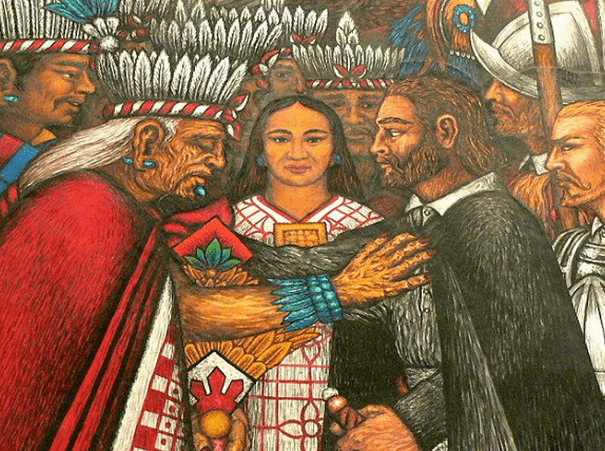Winner of the Fall 2016 StMU History Media Award for
Best Article in the Category of “People”
Best Article in the Category of “World History”
Largely due to the importation of disease and use of superior weapons, the Spaniards were able to conquer the Aztec capital of Tenochtitlan, kill the empire’s last emperor, Cuauhtémoc, and bring the Aztec empire to an end. Few know of La Malinche, the indigenous interpreter of Hernán Cortés, whose linguistic abilities were used to facilitate important conversations between the Spaniards and the indigenous leaders. Without the help of La Malinche, perhaps the Aztec empire would have survived.
Born between 1502 and 1505, La Malinche was named Malinalli Tenepal, the first part of her name being a Nahuatl term for the twelfth day of the month in correspondence to the Aztec calendar, and the second part of her name meaning “lively.” She was born of nobility in Paynala within the region of Veracruz. Her troubles started at a young age after the death of her father. La Malinche was ousted from her home to ensure her new half-brother received the inheritance of the family instead of her, since she was the eldest child. She was given to “some Indians of Xicalango.”1 Then the Indians gave her to a nobleman in Tobasco, a region in the Yucatan. When Cortés arrived to Tobasco, he was offered twenty slaves, one of them being La Malinche. Having lived in Veracruz, a Nahuatl-speaking region, and then being sold into a Maya-speaking region, La Malinche knew both languages and she was soon recognized for the linguistic talents that could benefit Cortés in his conquests.2

The few glimpses of La Malinche and how her presence as an interpreter accelerated the fall of the Aztec empire can be found in the writings of the Spanish explorers, specifically from Hernán Cortés, her “lord and master.”3 From the second letter Hernán Cortés wrote to Emperor Charles V, dated October 30, 1530, Cortés speaks of La Malinche as “a female interpreter that I had, who was a native of this country, and whom I obtained at Putunchún on the Rio Grande.”4 This confirms the vague aspects of her life that we already know. But most importantly, in this context, this letter goes on to tell of a scenario in which La Malinche saved the Spaniards from an ambush by the Cholulans. La Malinche was told by the wife of a native leader that they planned to attack the Spaniards and if La Malinche came with them, she would be protected. La Malinche delivered this message to Cortés, which ultimately led to the massacre of Cholula and provided a direct path to march towards Tenochitlan, the capital of the Aztec empire.5 This leads to the question of whether or not La Malinche was a traitor or a survivor. Did she explicitly want the Aztec empire to fall or did she just want to save herself from the carnage?
With no traces of primary sources from La Malinche herself, her story has been retold by various scholars without much consistency, nothing ever being certain. Up until the twentieth century, La Malinche was viewed as a traitor to her country Mexico. In 1861, on the celebration day of Mexico’s Independence, Ignacio “El Nigromante” Ramírez, a Mexican journalist, addressed the Mexican people by saying, “One of the mysteries of fate is that every Mexican owes his downfall and disgrace to a woman, and to another woman his salvation and glory; the myth of Eve and Mary is reproduced everywhere; we indignantly remember Cortés’s mistress and will never forget, in our gratitude to Doña María Josefa Ortiz.”6 La Malinche is seen as playing a key role in the subjugation of the Mexican peoples to Spain, while Doña María Josefa Ortiz did the contrary and liberated the country. However, many Chicana writers and modern scholars are trying to rewrite the tale of La Malinche to understand the complexities of her choices and to vindicate her. For example, Gloria Anzaldua promotes the idea that La Malinche had a “new consciousness,” that she voluntarily served as the interpreter of Cortés not only to save herself, but also because she knew that a new mestiza culture was going to be born (especially considering she had a son with Cortés in 1524).7 She made a conscious effort to exchange language and cultural aspects from each side in order to facilitate the emergence of the new mestiza society; however, with that came brutal consequences in the shape of warfare and mass death in the New World.
Whether or not La Malinche’s role as Cortés’s interpreter was traitorous, simply an effort to survive, or some other complex reason involving love for Cortés, hate for the Aztec empire for the cruelty she faced after being ousted from her home, or promotion of the new mestiza culture, no one will ever know the true story of the Indian, slave woman who traveled alongside Cortés towards the culmination of the Aztec empire.
- Bernal Castillo del Díaz, The Discovery and Conquest of Mexico, 1517-1521 rev. American ed., trans. A.P. Maudsley (New York: The Noonday Press, 1965), chap. 22-23. ↵
- Pilar Godayol, “Malintzin/ La Malinche/ Doña Marina: re-reading the myth of the treacherous translator,” Journal of Iberian and Latin American Studies 18, no. 1 (April 2012): 61-68. ↵
- Castillo del Bernal, chap 23. ↵
- Hernan Cortes to Emperor Charles V, October 30, 1520, in Letters of Despatches of Hernando Cortes, to the Emperor Charles V., trans. (New York: Wiley and Putnam, 1843), letter II. ↵
- Hernan Cortes to Emperor Charles V, October 30, 1520, in Letters of Despatches of Hernando Cortes, to the Emperor Charles V, letter II. ↵
- Rosario Pérez-Lagunes, “The Myth of La Malinche: From the Chronicles to Modern Mexican Theater” (PhD dis., Virginia Polytechnic Institute and State University, 2001), 24. Although she was of Spanish descent, Doña María Josefa Ortiz was born in Valladolid, Mexico in 1768 and identified herself as Mexican. She and her husband were both a part of the rebellion that ultimately led to Mexico’s independence from Spain in 1824. ↵
- Godayol, 68-70. ↵



230 comments
Sara Ramirez
I think you did a good job remaining objective in regards to the intentions of La Malinche. The family of La Malinche stood out to me as antagonists of the story, selling her into a life of slavery, which ultimately lead to the fall of the Aztec empire. As a slave, La Malinche didn’t have many choices. She had no way to know the scope of death and destruction that would occur in the wake of her “betrayal.” I think La Malinche had an extremely difficult life, more difficult than many can comprehend to this day, which makes it difficult for me to pass any kind of judgement.
Sofia Andrade
I like the format and ending of the article. The article simply provides the information and theories, posses two sides, and the reader gets to choose which side of the two is more valid. Her close relationship to Cortes might have been an influence to her actions. Malinche might have put herself before an entire civilization.
Luis Magana
Everything that La Malinche went through must of been horrendous. Something so superior and overpowering just comes and invades your country. Even if they were outmatched, people didnt realize or know why La Malinche did what she did. She is only remembered as a traitor. This article gives the reader a different perspective on how things happened but no one really knows what motivated her to do what she did you can only infer.
Raymond Munoz
The article as a whole is very informative, though the conclusion is a bit confusing. The ending paragraph claims that “no one will ever know the true story of the Indian, slave woman who traveled alongside Cortés towards the culmination of the Aztec empire.” If that were true then this article would’ve never been written. The authors claim in the end contradicts the purpose of the article, but I think I know what they meant. The author most likely meant to say that the name of La Malinche was nearly forgotten in history, but not quite, thanks to research and articles such as this.
Rebecca Campos
I was never aware of who La Malinche was until this article. The article did a good job at remaining unbiased and allowing the readers to use the details within the article to draw a conclusion for themselves. I personally am unsure of why La Malinche did what she did. Regardless of the reason as to why, the one thing I can be certain of is that no matter what she did, she changed the course of history forever.
Esperanza Rojas
I really loved this article and how it was formatted. I never really heard of La Malinche, but read her story was quite heartbreaking. Knowing that she was thrown out from her home because her family chose her step-brother over her might a reason why her love is significant and intense for Cortez. She might not have felt that type of love before and took it out of proportion.
Julissa Cantu
While this article was relatively short to read, it held an intriguing story that raised a lot of questions. The focal point that surrounded the mystery of La Malinche’s motives behind her actions, while an open question, left a few events too open for interpretations in one’s opinion. The author mentioned that La Malinche was in love with her master however, she was not in a position to chose what she wanted and therefore, any sexual actions between the pair could not be consensual. Because of this inability, I believe the author should have made an argument for, perhaps, Stockholm Syndrome or making decisions under threat. While this is placed under the gender studies category, and the purpose was along the lines of exonerating La Malinche of undeserved criticism from men, such as the uncalled for comments by Ignacio Ramirez, the journalist from Mexico, one believes there were stronger cases for such an argument. The chosen stances were good also though.
Luisa Ortiz
It is true, as a Mexican native I have heard few almost nothing about La Malinche. We even have a saying when someone is being two faces: “you are a Malinche”. It makes me sad to say it but is true we are saying this without a context and a little information about her, I love how this writer explains her life and gives her another face with our making her a true hero but making us the readers wonder more about her. Now I want to read more about her!
Tyler Boyd
I find this article intriguing. I can’t even begin to imagine what La Malinche went through, having such a vastly technologically superior group invade your country. She as well as the rest of the Aztec people were vastly outmatched and not capable of dealing with this invasion. The worst part is that La Malinche is remembered as a traitor, but we don’t have any primary source to learn what her true motivations were.
Mariah Garcia
I have never heard of La Malinche so this article was very interesting to read. I didn’t know that she was the cause of the fall of the Aztecs. I can’t say if she was a traitor or a survivor since there isn’t much to her story. There could’ve been different alternatives to this situation but maybe La Malinche had already made up her mind from the beginning to stand by the Spaniards. However, even in today’s world, we got to look out for ourselves and I think that is the mindset La Malinche had for herself.